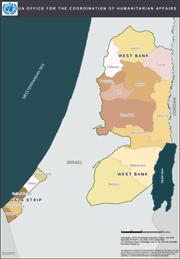 17 November 2012 – The World Health Organization (WHO) is deeply concerned about the escalating situation in the Gaza Strip and Israel and its impact on the health and lives of civilian populations in the area.
17 November 2012 – The World Health Organization (WHO) is deeply concerned about the escalating situation in the Gaza Strip and Israel and its impact on the health and lives of civilian populations in the area.
As of noon Saturday 17 November, the Ministry of Health of the Gaza Strip reported that 38 people had been killed: 27 adults, 2 of whom were women, and 11 children under the age of 18. Three people were also reported killed in Israel. 382 people in the Gaza Strip were injured: 245 adults, of whom 76 were women, and 137 children. Many of those injured have been admitted to hospitals with severe burns, injuries from collapsing buildings and head injuries. Health authorities have formed an operations room for the health sector and declared an emergency situation in all hospitals to cope with patients.
Before the hostilities began, health facilities were severely overstretched mainly as a result of the siege of the Gaza Strip. There has been a lack of investment in training, equipment and infrastructure, poor maintenance of medical equipment and frequent interruptions of power supplies.
The Ministry of Health was also facing critical shortages of medicines and disposables, with 192 medicines (40% of the essential medicine list), and 586 medical disposables (65% of the essential list) at zero stock. Many of the medicines at zero stock are lifesaving. Consequently, hospitals are now having to deal with the growing number of casualties with severely depleted medical supplies.
The Ministry of Health has postponed all elective surgeries due to the emergency and shortages in anaesthesia drugs. Non-urgent cases have been transferred to nongovernmental hospitals and health personnel have been asked to report to the nearest health facility for extended shifts. WHO is working with the Ministry of Health, United Nations Relief and Works Agency for Palestine Refugees in the Near East (UNRWA) and health partners to try and ensure that essential medicines and medical consumables are delivered to health facilities where they are needed most.
UNRWA operates 21 primary health care centres for 1.2 million refugees in the Gaza Strip and is preparing emergency assistance to the refugees. WHO will continue to monitor the overall health situation with the aim of supporting the functionality of the health system in this time of critical need.
WHO appeals to the international and regional community for urgent financial support to provide essential medicines to cover pre-existing shortages, as well as emergency supplies for treating casualties and the chronically ill. WHO requires US$ 10 million to cover all medicines and medical supplies for 3 months and will collaborate with donors to ensure that any donations are consistent with the needs in the Gaza Strip and conform to the drug donation guidelines endorsed by WHO and a number of international partners.
Latest update: 19 November 2012
Related links
See WHO guidelines for drug donations [pdf 72kb]
For more information, please contact: Emergency and Humanitarian Action, WHO Regional Office for the Eastern Mediterranean
Tony Laurance, WHO Representative, WHO country office in occupied Palestinian territory


